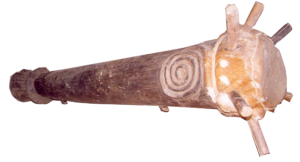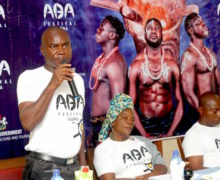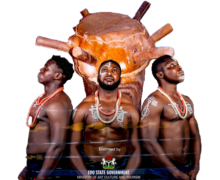
The historic Aba Drum Cultural festival in Igarra
The history:
‘Etuno’, Igarra is unique in many respects. The language Etuno Igarra dialect is a lone voice in Akoko-Edo Local Government Area, and infact the entire Edo State. It is similar to what is spoken in Ebiraland, Kotonkarffe, Toto, Abaji, Igala land and Wukari in Taraba State.
Over a thousand Rocks/Stones species are found in the area without clear explanation of their origin and this phenomenon is unique in itself. For this reason, it now acts as a study centre for students of Geology and Geography in Nigerian Universities across the country for their practical or field research work.

The historic Aba festival drum.
Our origin has been traced to Ebira and Oshuku Nationality whose members are found in Ebira land, Kotonkarfe in Kogi State and Toto in Nasarawa State. Our spoken language (Etuno) and the well-structured kindred are enough evidences that we have strong affinity in origin to these people.
Igarra never had its former rustic origins as group of hamlets but a scattered united village as Ugbogbo, Utua and Uffa. You hardly can distinguish these places now as development has taken place over time since we came down from Rocky Hills (Ifege) between 1911 and 1917 respectively. Ugbogbo is regarded as senior because they earlier came down before others during the period. Igarra Etuno, the headquarters of Akoko-Edo Local Government Area of Edo State is situated at the outskirt of Edo North. It is surrounded by Rocky Hills called the KUKURUKU Hills. Historically, the land is called ETUNO, and the Igarra people are known as ANETUNO.
The origin of the Aba cultural festival is almost lost to memory due to lack of historical records. It is originally a celebration of victory by the hunters over the initial settlers of the land now known and called Etônô, (Etuno) Igarra.
The festival derives its name from the popular Aba Drum, which is a relic of the Kwararafa in (Jukun kingdom), and an important symbol of Igarra culture brought along by Agbogumoza, a brave warrior and hunter, of Eziakuta-Opoporiku sub-kindred extraction – who led the advance party of hunters along the entire trajectory of migration from kwararafa to the present day Etunoland. The subsisting and surviving evidence of Agbogumozas superhuman abilities is his Footprint on a rock known as IRETOJI (Black Rock), located at the OKOVOZA axis of the Rocky Hills (Ifege) area of Igarra. That is why most of the songs rendered during the festival are original hunters songs of victory in Kwararafa dialect. Hence some people think they are not Igarra dialect, therefore, having the wrong perception that the festival is adopted.
Eziakuta Family Hunting expedition made tem fearless, brave and bold. No wonder therefore that their role in the migration of Anetunos from Kwararafa (Jukun Kingdom) in Wukari, through Idah and other places to Ebira land and finally to Akoko-Edo is most undoubted. Apart from being reliable, even when fighting against the European colonial masters, they are owners and custodians of most Igarra rich cultures among which is the famous Aba Drum.
The Aba Festival is the most spectacular/singular event in the celebration of Irepa Festival. It is the highest crowd-pulling of all the Irepa Festival events. Available records show that the event was first celebrated by the ANETUNOS Igarra people in 1789, long before the arrival of the Europeans and the creation of modern day Nigeria. It is an age-long and internationally acclaimed festival adjudged the sixth most important, unadulterated indigenous festival in the whole of West Africa by Total E&P in their 2006 yearly publications.
Celebration of Aba Festival:

The celebration of Aba festival in Igarra marks the commencement of Irepa/Azebani title ceremony. And it takes place every seven lunar or six calendar years and usually on the third day after the ENU the New Yam Festival of the same Irepa year, and which is usually in the month of August. The New Yam Festival is an annual event. The main event of the 2017 IREPA Festival is slated for Friday August 25th, 2017 which marks the graduation of the town’s Legislative and Executive age group, called OPOZE (Opa AVINEBE) to the highly revered council of Elders called the AZEBANI. The Opoze age group is unique in the sense that it is always the center of attraction during the festival because having been at the helms of affairs of the town for six years, its members are the chief celebrants of the occasion. Therefore, the beating of the Aba drum is the singular official rite which formally graduates members of one age group to the next one in the hierarchy.
On the day of the event, as a mark of honour, no other person is allowed to wear any white attire except the celebrants (the graduating Opoze) who would all climb a sacred Opoporiku Hill in the community’s Cultural Headquarters; OPOPORIKU. This special day is preceded in the evening of the previous day by the shooting of ceremonial Dane guns, first in the compound of the ODOVIDI-leader of the Age Group who must be the oldest celebrant from Eziakuta Opoporiku family by 2pm and followed by all the other celebrants by 4pm.
In the morning of the D-day, all celebrants prepare pounded yam for members of his kindred. Assorted drinks go with the eating which could be extended till everybody is exhausted. While Ugbogbo people will concentrate around their quarter, Utua & Uffa will dance to each others quarter respectively. This is later followed by the family gatherings to eat the mounds of pounded yam prepared for each family by the celebrants. By noon the celebrants dress up in complete immaculate white Agbada, white shoes and cap to match assemble at designated places to dance to Ofumamo at Opoporiku along Somorika road, Ugbogbo. The troupe will commence from Uffa to gather at Uneh, enroute to Ofumamo who are joined by their Utua people and move in the same convoy to Ugbogbo. At Somorika junction (Ugbogbo Central Market) they are joined by the Ugbogbo people then the Great trek to Ofumamo begins.
Traditional rites to be performed:
At Ofumamo, in Opoporiku, the (Cultural headquarters) of Igarra the Aba drums which must have been set ready at the Iretuba – a stone at the centre of Ofumamo, by the owners and custodians (Eziakuta Opoporiku family), are beaten for the celebrants to dance from where they are specially gathered. They are followed by Opoga the celebrants successors who had specially stayed on the Agidibobo stone. The celebrants dance and descend from where they stand, three times, which symbolizes their relinquishing of their Legislative, other roles, powers and duties to their successors. This confirms the ascension of each of the other age group into the age group system of the community. At this point, the Azebanis (Council of Elders) will send message to the celebrants to pay the Irepa fees, and they will respond by paying the fees. This payment qualifies them (celebrants) to take the Azabani/Irepa titles from their various family heads at a later date.
Although the Aba drum and Irapa are always kept in the custody of the oldest man in Abara Onubeji house of Eziakuta Opoporiku family but every Opoporiku man has free access and the right to beat the drum in every Aba Cultural Festival Day. However, it is pertinent to know that the beating of the drum does not wait for or recognize the arrival of any person or persons or any traditional head except for those celebrating, the Opoze. This is because all the traditional rites that is needed to be performed must be performed by the oldest man of Onubeji household in a room where the drums and Irapa are kept before the drum is brought out for the festival.
Also read: About Dr. Anthony Akande, the Afemai Development Hero of the Month.
Furthermore, it gladdens the heart to know that from time immemorial traditional heads (Oshidu, Otaru, Oshemdase and Oshemi) do not go to Ofumamo to grace the Irepa-Aba celebrations because they do not have any spelt out traditional rites, roles or functions to perform at the Arena. In fact, no person or persons including the Head of Onubeji Household has any role or function to perform at the Arena of the festival. It is however on record that the first time in the history of Igarra a traditional head ever attended the occasion was in 1987 when HRH Late Okuo Iluse II, the Otaru of Igarra, attended it in his 25 years of reign. He attended it because of the high tension generated then, due to some rift within the Abara Onubeji household in particular and Eziakuta Opoporiku family in general. His attendance dust down the tension and the festival was very peaceful. During his reign, Aba festival was celebrated four times in 1975 by his own age group, Opa Egeremi, 1981 Opa Ibajumo, 1987 Opa Gomina and in 1993 Opa Awo and he attended only once.
The forthcoming celebration is the recorded 38th edition in the history of the peace-loving and highly amiable Igarra community. Igarra people from all walks of life, nooks and crannies of the globe with friends and well wishers will come home either to witness or take part in it. The festival has witnessed a huge upsurge in the number of tourists attending the festival. The last edition, the 37th series witnessed over four hundred and fifty thousand attendees including local and international tourists. With the new repackaging of the festival by the Edo State Government through the collaboration of the Ministry of Arts, Culture and Tourism and the National Council for Arts, Culture and Tourism, the number or tourists being expected at this 38th series will be well over a million people.
The Aba 2017 Cultural event, the fourth since the return to civil rule in Nigeria, promises to be the biggest, largest crowd-pulling and most spectacular festival ever as innovations and other activities have been introduced to the festival since it was first celebrated Two hundred and eighty eight years ago. With the new repackaging of the festival by the owners and custodians with the collaboration of the Edo State Government through the ministry of Arts, Culture and Tourism and the National Council for Arts, Culture and Tourism in the Aba project, the number of tourists being expected at this 38th series will be well over `a million people.
The impact of Aba festival in Igarra:
Aba Festival of the Igarra people is becoming a huge tourist attraction and one can only hope that someday it could become something bigger and revered as the Osun Osogbo Festival, the Argungun Fishing Festival, the Ojude Oba Festival with international clout and flavour. Therefore, plans are on to list the festival on the calendar of World Tourism Organisation (WTO) as well as on the World Heritage Festival of UNESCO.
Congratulations in advance and see you again in August 2023.



Connect with us: